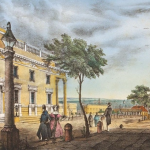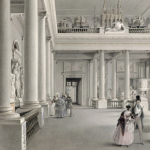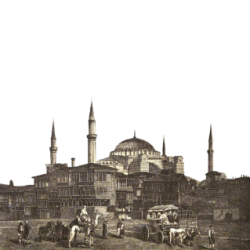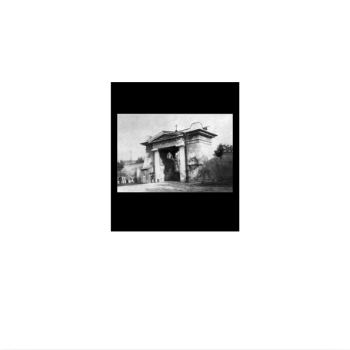ASTRAKHAN
Andrei Mikhailovich went to Ekaterinoslav in the summer of 1835 and took Katya along with him. The purpose of the visit was twofold, the first was official business, and the second was to visit his mother. His trips around the colonies continued, but this service, in its new form, began to bore him. Disorder and neglect arose in the administration, both due to General Inzov’s weakness and due to the excessive reduction of material resources continuing the organization of the colonies in such a way as to make them useful. This goal could only be achieved by careful and frequent on-the-spot observation of the economic development of the colonies. Although it was repeatedly stated by many businessmen (and some government officials) that administration over the colonies should not interfere in the direction of the arrangement of the economic life of the colonists, Andrei Mikhailovich was of a different opinion.
Of course, the administrator himself must know the matter at least in its principles and, most importantly, be able to inspire the trust of the settlers; then his actions would certainly be useful, especially if such leaders remained in their place for a long time. As was customary, however, capable administrators were constantly transferred from one place to another and even from one service to another. Andrei Mikhailovich saw himself where the late Kontentius had a direct influence on this subject, everything improved rapidly (improved animal husbandry, horticulture, housekeeping, infrastructure, etc.) Morality was improved, and negligent people were corrected. Wherever this influence ceased, the colonists became destitute, constantly seeking new privileges, which they often achieved through their importunity. This only aroused the indignation of the neighboring Russian settlers (who considered the Germans to be some kind of privileged caste of people.) But after the death of Kontenius, the architect of a decades-long plan of governance for the colonists lost support. Kontenius’s projects were completely lost sight of by the Trustee Committee, which limited them exclusively to paperwork and demands for the delivery of many reports with incorrect figures.
General Inzov’s attention was devoted to the organization of Belgrade and concerns about increasing the migration of Bulgarians to Bessarabia (who had now completely withdrawn from Russian dominion.) He paid little attention to other matters. As a result of all these circumstances, Andrei Mikhailovich’s official position became false, so to speak. General Inzov did not trust Kontentius in everything (and even less in Andrei Mikhailovich.) Weighed down by these matters, Andrei Mikhailovich began to think whether he should take advantage of Count Vorontsov’s offer to go into his service. Fate intervened to remove him from the unpleasant situation. Andrei Mikhailovich received a letter from Count Bludov proposing that he be transferred to the newly established position of Chief Trustee over the Kalmyk people in Astrakhan.[1] Count Bludov insisted on his consent and tried to persuade him to this transfer, assuring Andrei Mikhailovich that his service in Astrakhan would not last long and would serve only as a transitional path to higher positions. Such a long move with the family, all the household furnishings, and servants, and leaving their new home without his supervision and oversight, again upset Andrei Mikhailovich. But, again, there was nothing to do about it. He was only about forty years old, healthy, and could work. Count Bludov so strenuously persuaded him to transfer, encouraging him with the hope of reward in the future, and so, he agreed.
At the end of 1835, his transfer followed (with a decent allowance for the move.) Having rented out their estate, in May 1836 the Fadeev family set off to Astrakhan. All the foreign settlers of the Novorossiysk region were very saddened by the departure of Andrei Mikhailovich and showed him their sympathy and gratitude in any way they could. The colonies through which he had to pass on the way received him and saw him off with the most sincere expressions of the deepest sympathy.
The Volga, above Tsaritsyn, was already divided into two branches: the Old Volga and the Akhtuba, which, as they approached the sea, were divided into many branches and channels. Along these channels, on the coast, fertilized by their spring floods, the entire settled population of Astrakhan Province had long taken refuge. The Tatars, once the masters of the region, preferred these places for their nomadism, where their herds found plentiful grass and watering places. This was proven by the ruins beyond the Volga, in the state-owned village of Selitrennoye, and the beginnings of Astrakhan in the 14th century.
Along these Volga channels, marked by robberies and plunder, Cossack villages began to appear, starting in 1731, founded by the descendants of the Streltsy, the Don and Kazan settlers. (The Cossacks were divided into three tribes: the Cossacks of the Don, the Cossacks of the Islands of the Dnieper, and the Free Cossacks.)[2] Labor and industry found shelter within the city of Cherny Yar, founded in 1627, near the fortifications of Krasny Yar and Yenotaevskaya Fortress, built in 1741 to keep the Kalmyks from raids. This was the beginning of the formation of the local cities. This Volga population increased in the last century from the Serfs who lived in the settlements (both state-owned and landlord) in the coastal area between cities and villages. The Russian Empire, before the early nineteenth century, had supported peasant colonization in several ways. It offered incentives to serf owners to relocate their serfs to the borderlands; it also encouraged the resettlement of dissenters, and religious sectarians along the State’s frontiers, and turned a blind eye to runaway serfs whose presence on the borders could be used to the State’s advantage.[3]
The population that settled along the Volga consisted of Cossacks living in the villages, Serfs (state-owned and landowners,) and Tatar settlers. Additionally residents of the district cities: Cherny Yar, Yenotayevsky, the provincial city of Astrakhan, and the city of Krasny Yar with the district located on one of the channels closest to the sea. The population of the district towns was made up primarily of Russian officials, traders, and artisans, (except for a few Kalmyks who were hired to work,) and Kirghiz who became shepherds. In the provincial city, the majority of the population, the trading class, were Armenians, Tatars, Persians, Georgians, Greeks, several Indians, and the constantly changing crowds of Kalmyks, Kirghiz, Karakalpak, and Tatars of various names. They migrated to sell livestock and purchase Russian products. The city of Astrakhan was the center of the military, naval, and civil administration of the entire vast steppe region, and taken together, one might imagine the living picture of the blending of Europe and Asia. There were Armenian priests next to Kalmyk priests; Cossacks next to Persians; Tatar mullahs talking with the Kirghiz; An Armenian offering his wares to a provincial dandy dressed in a coat; a dandy merchant woman next to a Kalmyk woman; a Persian consul returning from a hunt and stopping to talk with a provincial official. A black-eyed Armenian woman strolling in her picturesque national costume while a Tatar woman, covered with a white chador, timidly creeps along the walls, making her way into the Persian courtyard, while her son catches up with her, playing with an unripe watermelon as though it were a ball.[4]
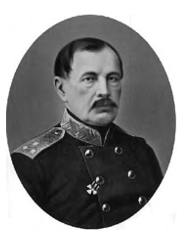
Ivan Semenovich Timiryazev. Governor of Astrakhan (1834-1844.)
The Fadeevs traveled through Ekaterinoslav, Novocherkassk, and Tsaritsyn, and rested with pleasure in Sarepta before eventually safely arriving in Astrakhan. The summer was soon upon them, and they suffered considerably from the heat (which was severe in Astrakhan.) There was nowhere to hide from it, for five hundred miles, in all directions, there was only steppe, sand, and water. There were many gardens, sure, but no trees, and consequently no shade at all. In Astrakhan they saw, as it were, a new world; new places, new people, a new kind of occupation. The military governor of Astrakhan at that time was General Timiryazev, a surprising mixture of opposites in character, although with a positive predominance of kind nobility.[5] He was an intelligent, honest, well-intentioned, straightforward, energetic man, but at the same time passionate, partly autocratic, and despotic. He wanted to manage everything in his way, but having served all his life in the military, he was still little acquainted with the civil part and therefore often did not achieve the results he desired. He did not get along with many, but from the very beginning, he was very good to Andrei Mikhailovich and always retained a friendly disposition. In official relations, Andrei Mikhailovich sometimes tried (as much as he could,) to reason with him, which, for the most part, he succeeded. As an intelligent man, he understood when he was told the right thing, but at times there was a lot of trouble to cope with his intractability.
Astrakhan society was not distinguished by its vastness, or rather, it was very limited. In terms of education and knowledge of social customs, the Armenian Archimandrite, Seraphim, was the only notable name.[6] He was a fairly well-read man, who had seen almost all of Europe and part of Asia. He was interested in and occupied more with worldly pleasures, it seemed, than with his spiritual affairs. Perhaps it was because he had so few spiritual affairs, that they could not bother him. He alone had a decent library, received good French books, and subscribed to magazines. Andrei Mikhailovich spent holidays pleasantly with him (and borrowed his magazines.) Of the other Armenians, several wealthy citizens stood out and distinguished themselves from the rest of their brothers only by the fact that they often gave rich feats and drinking parties for the amusement of the Astrakhan administration.
The richest and most distinguished of the Russian citizens of Astrakhan at that time was Kirill Fyodorovich Fyodorov. He himself did not know his own age, but that he was extremely old was proven by the stories he told about himself. Coming from the sons of sextons in Tambov Province, having somehow learned to read and write, he accidentally reached Astrakhan and was appointed to the salt board, first as a watchman, and then as a scribe. Having been convicted of stealing documents from the archive for bribery, he was flogged, but despite this, he was left in service in the same salt administration, due to the intelligence he had acquired in the clerical departments. He continued to serve there for some time, and then in other Astrakhan government offices. When he was about forty years old, he received his first officer’s rank, and then in 1782, he received the Imperial Order of Saint Prince Vladimir, an award for thirty-five years of service in the officer’s rank.[7] Consequently, it was easy to calculate how old he already was in 1830. During his service, until the accession to the throne of Tsar Pavel Petrovich, he managed to save up several tens of thousands of rubles and went with them to the coronation in Moscow in 1797. He was a great joker and a talker of sorts. This is how he became famous among the Prosecutor General, Prince Alexander Borisovich Kurakin, from whom he took for a long term the lease of the Astrakhan fishing waters granted to him for the coronation. Prince Kurakin begged for them for himself, not even having an idea of the value of these waters, but only knowing from the income that the treasury then received from them, that they could deliver up to twenty-thirty thousand a year. Fedorov also assured him of this, and therefore, it seems, he took them for thirty thousand rubles a year, and he received from them several hundred thousand rubles annually. To this profitable swindle were added other profitable speculations. Kirill Fyodorovich, in a short time, became a wealthy man and the first aristocrat in Astrakhan. He began to live like a gentleman. He built himself a large two-story stone house with two alabaster, painted lions on the frills, and lit it up luxuriously (but they were always very dirty.) He invited all newcomers to Astrakhan to his place for gaudy dinners, declaring at the same time that his Astrakhan pigs dined with him. He never abandoned his shameless tricks, however.
He had a bosom friend, a councilor of the treasury chamber, who before his death appointed him guardian over his minor daughter and left her 15 thousand rubles in the custody of Kirill Fyodorovich. When she reached the age of majority, she married a naval officer. Fyodorov did not say anything about the money left by her father, but everyone in Astrakhan knew about it. Soon after the wedding, everyone began to ask him to give them the money, but Fyodorov with unshakable indifference declared that this was not true and that he had not received any money from her father. All the admonitions and arguments of his acquaintances were useless. Those who knew the matter were in vain. There was no written document or statement. The trial began, and it came to the oath of purification. Fyodorov, in a white shirt, with a black candle in his hands, walked barefoot into the cathedral to the sound of bells and swore that he had not received any money. This solemn ceremony was performed in the presence of the entire Astrakhan people (according to all the rules of the rite of the oath of purification.) But, unexpectedly Fyodorov’s conscience spoke, and so insistently that a few days later he privately confessed his guilt and returned the money.
All his wealth did him no good. Certain scoundrels knew exactly how to cheat Kirill Fyodorovich, and at the end of his life, he was ruined, leaving almost nothing, except hopeless monetary claims to the treasury and private individuals. Among the craftsmen who especially deceived him, the most fascinating was a certain State Councilor Shpakovsky, an adventurer and a rather clever and educated man, but whose selfish tricks in the highest degree constituted his reputation. Without hesitation, he recounted these tricks of his. The most curious of them was that, while still in his youth, he had gone on a spending spree to the end and, having reached the other extreme from a dissolute life, after the death of his brother during the Siege of Ochakov, a rich and important man, he managed to steal his identity, took control of his money and papers and used his property exclusively alone (without giving anything to the other brothers and sisters.) None of them managed to expose him, and so he remained for the rest of his life under the name of his brother and continued his service. In Astrakhan, already an old man, he held the position of inspector of the postal district. Andrei Mikhailovich found him already dismissed from his post, but he was not discouraged and worked hard in the field of informing, litigation, and all sorts of snitching tricks, having managed, among other things, to cheat Kirill Fyodorovich out of several hundred thousand rubles. He died in Astrakhan, in extreme old age and extreme poverty.
Of the other distinguished persons with whom Andrei Mikhailovich became acquainted were the Russian Archbishop Vitaly, a kind old man, but a very mediocre archpriest; the commandant Rebinder of the same family; the Cossack ataman Levenstern, and after him von der Brugen, both good people. The latter was related to the Fadeevs by his wife, Briseman-von-Nettig, a niece of the late Elena Ivanovna. It was remarkable that the atamans of the Astrakhan Cossacks were most often Germans, who knew neither the spirit nor the qualities of this people.
The civil service in Astrakhan at that time (and, it seems, later too) was the worst. Bribery and fraud of all kinds seemed to be ingrained in their blood, to the point that one of the officials on special assignments of the military governor who was considered one of the best, while reporting to him on his books, stole five rubles from his table. Among the landlords in the provinces there were several nobles, such as Kurakin, Bezborodko, Brekhov, and others, but they never even looked into Astrakhan; and all the rest, even there, were of the same kind as the local clerks, with a few exceptions, and were descended from them.[8]
The most honorable of the landowners was considered to be the provincial leader of the nobility, Milashev. He came from the common people of the Saratov Province, spent his youth in the treasury, and with the transfer to service in Astrakhan, somehow achieved the rank of civil servant and was engaged in clerical work for the rich tax farmer of the fisheries Shaposhnikov. The latter married him to his sister, having first given him the rank of collegiate assessor, as they say, solely so that he could buy real estate for himself in the name of his sister. Indeed, he bought a rather significant one in Saratov Province, and in Astrakhan a small one, so Milashev might have the opportunity to become the leader of the nobility, which he did become; first of the district, and then a provincial one. This “Mr. Provincial Marshal,” in essence a far from stupid man, was Governor Timiryazev’s privileged jester. To get him a motley uniform, Governor Timiryazev asked for a chamberlain’s title, which suited him like a clown. When Governor Timiryazev played billiards with him, then, when he lost the game, Milashev had to crawl on all fours under the billiard table three times, and then kiss Governor Timiryazev’s hand. Incidentally, many of the Astrakhan ladies came to kiss Timiryazev’s hand on ceremonial occasions, of course, against his will (he spoke of this with contempt and disgust.) After Governor Timiryazev left Astrakhan, Milashev left the leadership and moved to live in his wife’s estate in the Saratov Province. Before his death, remembering his origins, Milashev instructed that he be buried in bast shoes and an unpainted coffin.[9]
-
- NOVOROSSIYA
- The Arbiter Of Europe’s Destiny.
- The House Dolgorukuy
- Madame Krüdener
- Ekaterinoslav
- The Arabat Arrow
- The Mystery Of General Inzov
- The Doukhobors
- Pushkin
- Chuguev Military Settlement
- “The Blessed”
- The Decembrists
- Penza
- Independence
- Last Words Of Samuel Khristianovich Kontenius
- “Amid Coffins And Desolation”
- Rusalka
- Dead Souls
- Secret Passages
- Astrakhan
- Nevsky Prospekt
- Kalmyk Ulus
- Love And Ambition
- Duellistes
- Pyatigorsk
- A Heroine Of Our Time
- Winter Palace
- Zeneida R-Va
- Steppes
- Letter To Natalya
- Fire And Ice
SOURCES:
[1] Dmitry Nikolayevich Bludov, (1785-1864) “On February 12, 1832, Bludov was appointed Minister of Internal Affairs and managed this department until 1838. During this time, in addition to fulfilling his direct duties, he sat on various committees, including those on the issue of admitting people of unfree status to educational institutions and on the consideration of the Kiselevsky project on the management of state property, and from May 24 to September 17, he managed the Ministry of Justice for the second time, while also remaining Minister of Internal Affairs.” [Polovtsov, A. A. Russian Biographical Dictionary. Vol. III: Betancourt—Byakster. Publishing House Of The Imperial Russian Historical Society. St. Petersburg, Russia. (1908): 94-98.]
[2] The last of these tribes, the Free Cossacks, were composed of descendants of emigrants from Russia, who, troubled by ill-treatment by Russian authorities, settled in the Caucasus, Turkey, Romania, and Persia. The Free Cossacks were largely Christian, though there were some Muslims, were a confederation governed by a great council known as the Kroug. Comprised of delegates from the various villages, the Kroug, which regulated all the important affairs, elected an officer known as the Ataman who served for life, and who had the power to veto decisions made by the Kroug. In times of peace the Ataman was assisted by a council of eleven persons; he had the power of life and death over those whom he ruled. [“An Abyssinian ‘Moscow.’” The Englishman’s Overland Mail. (London, England) February 27, 1889; “L’Archimandrite Païsi Et L’Ataman Achinoff. Une Expédition Religieuse En Abyssine.” The Literary Digest. Vol. III, No. 17. (August 22, 1891): 18-19.]
[3] Sunderland, Willard. “Peasants On The Move: State Peasant Resettlement In Imperial Russia, 1805-1830s.” The Russian Review. Vol. LII, No. 4 (October 1993): 472-485.
[4] [Article III in: Buhler, Fyodor Andreevich. Nomadic And Sedentary Foreigners In The Astrakhan Province: Article I.” Otechestvennye Zapiski. No. 7 (1846); Buhler, Fyodor Andreevich. Nomadic And Sedentary Foreigners In The Astrakhan Province: Article II.” Otechestvennye Zapiski. No. 8 (1846); Buhler, Fyodor Andreevich. Nomadic And Sedentary Foreigners In The Astrakhan Province: Article III.” Otechestvennye Zapiski. No. 10 (1846); Buhler, V. Nomadic And Settling Foreigners In The Astrakhan Province: Article IV.” Otechestvennye Zapiski. No. 11 (1846.)]
[5] “[Ivan Semenovich Timiryazev,] Lieutenant General, from the nobility of the Moscow Province, was born in 1791. Having begun service in 1807 as a Yevker in the Life Guards Jaeger Regiment, [Timiryazev] the following year (1810) transferred to the Horse Guards, where he was promoted to cornet; with the regiment he took part in the Patriotic War, and at its end was appointed adjutant to Tsarevich Konstantin Pavlovich, who knew him well from the Life Guards Cavalry Regiment, in which [Timiryazev]was regimental adjutant. [Timiryazev] served with the Tsarevich until 1819, when he retired with the rank of colonel (since 1816) and remained in it for eight years, and then again entered service in the Life Guards, Grodno Hussar Regiment. In 1829 he was granted the aide-de camp. During the uprising in Warsaw he set out on a campaign with the regiment and for his distinction during the storming of Warsaw on August 25 and 26, 1831, he was promoted to major general and enrolled in His Majesty’s retinue. In 1834, [Timiryazev] was appointed acting Astrakhan Military Governor and manager of the Civil Department; in 1835, he was confirmed in the position; in 1840, he was promoted to Lieutenant General; in 1844, he was dismissed from the position and in 1846, he was retired. This change was caused by complaints about the improper actions of [Timiryazev] in his capacity as governor, but a senatorial audit carried out by Prince Gagarin revealed that the assumptions were unproven.” [Polovtsov, A. A. Russian Biographical Dictionary. Vol. XX: Suvorova-Tkachev. Publishing House Of The Imperial Russian Historical Society. St. Petersburg, Russia. (1912): 519-520.]
[6] “The Armenian Archimandrite Seraphim [was] a most affable, intelligent, and well-informed monk, who besides his native language, speaks the Russ, Turkish, French, and English. He has travelled extensively and resided a considerable time in India. His present charge is a seminary for the tuition of Armenian youths, in which about fifty receive the elements of a polite education. He has recently begun to print some Armenian books for the benefit of his countrymen. In 1819 he published an elementary Encyclopedia, and, in [1926,] a Russian and Armenian Dictionary. According to the estimate he gave, the number of Armenians scattered through different countries amounts to nearly four millions. Multitudes have recently joined the Roman communion; and the efforts made by the Catholics, with a view to effect such conversions, are indefatigable. Subsequent to the late catastrophe at Constantinople, three monks have been sent by the Patriarch of that See, as candidates for the episcopal dignity; but none of them has been accepted. The Bishop, against whom the Armenians have been so greatly enraged, has sent one of his partizans to Etchmiadzin, in order to plead his cause before the Patriarch; and a conference is now holding at Tiflis, to decide on the matter. About thirty years ago, 25 or 30,000 Armenians were trained to the use of arms in the north of Persia; but they have long ago been dispersed, and little of true patriotic feeling is now left among that people. Till about the time just referred to, a great number of ancient and important MSS. were preserved at the monastery of Etchmiadzin; but few now remain, the most part having been conveyed to Venice, which may be considered as forming, at present, the principal seat of Armenian literature.” [Henderson, Ebenezer. Biblical Researches And Travels In Russia. James Nisbet. London, England. (1826): 55-56.]
[7] The Imperial Order of Saint Prince Vladimir was an Imperial Russian order established in 1782 by Catherine the Great in honor of the deeds of Saint Vladimir, the Grand Prince who Baptized the Kievan Rus.
[8] Grebennikov, Gennadi. “54 Years And Immortality.” Soviet Life. No. 2 (February 1970): 16-19, 35,56.
[9] Fadeyev, Andrei Mikhailovich. Vospominaniia: 1790-1867. Vysochaishe Utverzhd. Yuzhno-Russkago. Odessa, Ukraine. [Russian Empire.] (1897): Part I: 114-122.


